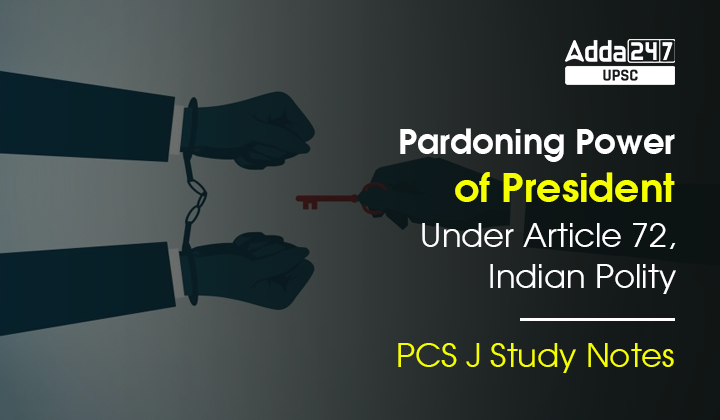Table of Contents
Pardoning Power of President: The Indian Constitution grants the President of India, the power to grant pardons, reprieves, respites or remissions of punishment or to suspend, remit or commute the sentence of any person convicted of any offence. This power of President is provided under Article 72 of the Constitution of India. This power of President is an essential power vested in the executive branch of the government. It is designed to correct any errors in the judicial system or to provide relief to a convict who may have been wrongly convicted or sentenced. In this article, we will discuss the pardoning power of President under Article 72 of the Constitution of India in detail.
Meaning of Pardoning Power of President
These powers of President refers to the power vested in the President to forgive or reduce the punishment of a convicted person. It is a discretionary power and is exercised by the President on the advice of the Ministry of Home Affairs. The article will further discuss in detail the types of pardon. The readers can refer to this article in order to know the types of pardon under the pardoning power of President.
Types of Pardoning Power of President
Article 72 of the Indian Constitution empowers the President to grant pardons, reprieves, respites or remissions of punishment or to suspend, remit or commute the sentence of any person convicted of any offence. The different types of pardoning power under Article 72 are:
- Pardon: Pardoning power of President is an act of grace that exempts the convicted person from the punishment altogether, and it also removes all the legal consequences of the offence.
- Commutation: Commutation is the act of substituting a less severe punishment for a more severe one. For example, the President may commute a death sentence to life imprisonment.
- Remission: Remission means reducing the amount or the extent of the punishment without changing the nature of the punishment. For example, the President may remit a sentence of 10 years imprisonment to 5 years.
- Respite: A respite means postponing the execution of a sentence for a temporary period. This is usually done in cases of pregnant women or women with young children.
In addition to the above types of pardoning power, the President can also suspend the sentence of a person convicted of any offence, thereby putting the sentence in abeyance. The suspension of sentence can be conditional or unconditional, and it can be for a specified period or indefinitely.
Circumstances Under Which Pardoning Power of President Can Be Exercised
This post also deals with when can the pardoning power of President be exercised. The readers can go through this article in order to know when can the pardoning power be exercised. The pardoning power can be exercised under the following circumstances:
- When a person has been sentenced to death: The President can grant a pardon, commute or suspend the sentence of a person sentenced to death.
- When a person has been convicted of an offence against the Union law: The President can grant a pardon, commute or suspend the sentence of a person convicted of an offence against the Union law.
- When a person has been convicted of a court-martial: The President can grant a pardon, commute or suspend the sentence of a person convicted of a court-martial.
Procedure for Granting Pardons
The procedure for granting a pardon under Article 72 is as follows:
- The convict must submit an application for pardon to the President through the Ministry of Home Affairs.
- The Ministry of Home Affairs will examine the application and prepare a report.
- The report is then submitted to the President for consideration.
- The President will consider the report and make a decision on whether to grant the pardon or not.
Scope of Judicial Review for Pardoning Power of President
This power is subject to judicial review. However, the scope of judicial review is limited. The courts can only examine whether the decision was taken in accordance with the procedure prescribed under Article 72 or whether it was based on relevant considerations. The courts cannot question the merits of the decision taken by the President.
Pardoning Power of President Under Article 72
In conclusion, the pardoning power of the President under Article 72 of the Constitution of India is a discretionary power that is designed to provide relief to a convict who may have been wrongly convicted or sentenced. It is an essential power vested in the executive branch of the government and is subject to judicial review. The President can grant four types of pardons: pardon, commutation, remission, and respite. The pardoning power of President is exercised on the advice of the Ministry of Home Affairs and is subject to the procedure prescribed under Article 72.
Judiciary Related Links:
Himachal Pradesh Judiciary Previous Year Question Papers
Himachal Pradesh Judiciary Syllabus
Himachal Pradesh Judiciary Exam Eligibility



 TSPSC Group 1 Question Paper 2024, Downl...
TSPSC Group 1 Question Paper 2024, Downl...
 TSPSC Group 1 Answer key 2024 Out, Downl...
TSPSC Group 1 Answer key 2024 Out, Downl...
 UPSC Prelims 2024 Question Paper, Downlo...
UPSC Prelims 2024 Question Paper, Downlo...





